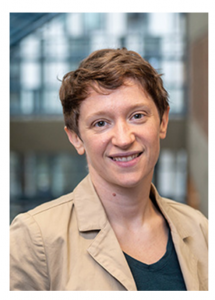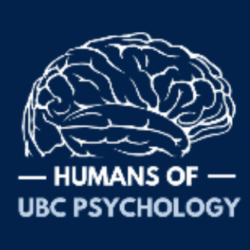By Diana Bratu and Z. Aazadeh Raja

Q: Could you tell us a little bit about your journey to getting to teaching psychology at UBC?
When I was growing up, I thought psychology was nothing other than figuring out how to help people who are struggling. And I didn’t see that as one of my strengths. But I was always interested in people and learning about why we are the way we are. I started out in health studies at McGill University and as part of that program, I had to take a psychology course and realized oh, this is just what I spent all my time thinking about. So I switched my major and I kept doing that and I got to see what research was like firsthand in the field and I thought it was really cool. Eventually I went to grad school at University of Waterloo in Ontario, achieving a PhD and then becoming a professor, where I started out at the Business School at Stanford and I missed being in Canada, so I ended up getting this job at UBC.
Q: How did working at the Business School at Stanford coincide with psychology?
You want to understand people in the business field: your clients, employees, managers and your competitors. Business schools include two areas for psychologists. One is in marketing, understanding consumers and how they behave in buying products/services. I was in the other area called organizational behavior.The classes I taught there were very similar to intro psych courses but more applied to the business context of: negotiating, hiring and firing people, etc.
Q: What area of psychology are you in at UBC and what is your research about?
I’m in Social Psychology which is understanding why people are the way they are in terms of relationships with others. My specific research interests are around big society type questions, like political psychology and understanding why people support certain political standpoints, how people can disagree and the challenge of communicating with others about politics. To also consider moral beliefs and how we think about inequality and social class.
Another thing that drew me to political psychology is the idea that we are really good at believing what we want to believe. For example, if your friend is in a fight with someone else, like obviously, your friend is always right, and that other person is always wrong, right? It’s like mental acrobatics where we decide what counts as fair based on how well it works for us or we decide, or who’s right in an argument based on who we care about more. Which altogether plays more dramatically in politics. So if the leader of a country does something terrible, that leader’s supporters aren’t going to see it in the same light as people who don’t support that leader; two sides looking at the same thing but with such different glasses on. I think trying to understand that and how we overcome those failures of communication and the divides that come with that, is something we need to figure out quickly. My research is more about bringing awareness to this problem rather than finding specific ways of solving the problem.
Q: What advice would you give to students who are also trying to get into research?
So the first thing I would say is not being able to find research opportunities is such a common experience. The reality is that that is such a common experience. And I’m so sorry that it’s so challenging. The reality is that we have a lot more demand than we have space in our labs to accommodate volunteer research assistants. This is definitely a problem that we’re recognizing in the department. Another aspect of that, though, is that it’s not clear to us that people are getting research experience in a way that reflects sort of like equity and inclusion and diversity. And so we’re trying to work on ways of improving on that front and making sure that you know, all kinds of different students have the same access, even though there isn’t access for everyone right now, like at least that we’re trying to make sure that we’re removing any kinds of biases that we have in that in that process and trying to make opportunities more accessible to many folks.
I think the way that works for most people is to find a way of getting into research is to know somebody who’s doing research. So whether that’s a graduate student or a faculty member who’s doing research you think is interesting, getting to know what that research looks like and what that lab might be looking for and understanding a little bit about what kinds of questions that lab is asking so that you can talk about those when you’re applying to work in their lab. That’s always a good idea and ways to do that. I mean, in every course you have a professor and every course you have the TAs, so try to kind of look into what kinds of research those folks are doing and whether that’s something that can be interesting to you.I guess one thing I’ll say this doesn’t necessarily help the problem but with COVID I think a lot of people have been more willing to take on sort of virtual research assistants because so much of the work can be done virtually. That sort of expands your possibilities a little bit beyond UBC. It’s not a given that somebody at a different university would necessarily take you seriously or take you on as a volunteer research assistant. But again, you don’t really lose much by reaching out and asking. So if you know, you come from somewhere that’s not Vancouver and there’s a university there that you could have a connection with,you’re always free to reach out to them.
Q: As a professor what are some of your go-to teaching methods? What was it like teaching your first class?
My first class at the business school was brutal as I was teaching MBA students. Firstly, they were older than me, and secondly I didn’t know anything about the mechanics of business. The students, expectedly, knew a lot more about the mechanics and acronyms of business, which is something I had to learn on the fly. It was difficult and I did feel insecure as the authority figure in the class. Although overall it was good being thrown into the deep end of the pool, as I learned a lot. So when moving to UBC and started teaching undergrads, I had the grit to figure it all out. My go-to strategies are encouraging student input and repeating key concepts. Actually I do miss the zoom chat from teaching virtually as people were a lot more interactive than in person classes. I’m currently teaching statistics which is a lot of hands-on learning, so I also encourage students to work things out by themselves before I deliver the solutions in class. And lastly, I don’t mind making a total fool of myself to keep people’s attention and engagement, like hosting “Friday Dad Jokes”.
Q: What advice would you give to incoming undergraduate students who are confused about what they want to study?
What’s always been my life strategy is to do more of what you enjoy now. If the courses that you have to take for a certain major end up being courses you hate, maybe that’s not a great sign you’ll enjoy this thing in the future. For myself, a real lesson in the pandemic too, is that you don’t know what the future holds. Planning and doing things to enjoy life in the short term is the way to have a life that ultimately makes you feel fulfilled and happy. Overall, because the short term in the present, that’s really all we ever have.
Q: A related question to the one above is how would you help apply your advice to someone who is not having a great time at university and wants to drop out?
If you have reached the end of the first year and you haven’t liked any of the courses that you’ve taken, I would say think about trying another subject you know, if that’s something that you’re able to do given the program that you’re in. If this is something you have the luxury of, being able to take some time off to think about what you want to do. Life is always moving fast but the more people and things you love you surround yourself with, the better it is for us. Something I’ve discovered late in life is that our friends and family are usually better experts on us than we are. If you don’t know where your interests lie, its helpful to talk to your friends and family because they might have some insights into the kinds of things that you might like that you would never come to on your own because you’re not used to thinking about yourself in that way.
Q: What are some hobbies of yours?
I do a lot of mountain biking and some running. I just like to keep moving and enjoy reminding myself that my body has a use other than just sitting in front of a computer screen. My second hobby is centered around food. I really like cooking and eating, right now my favorites are tacos and Korean inspired roast chicken. Something that started during the pandemic was that every few weeks, a couple of my friends and I would get together on zoom and cook a recipe together. We would be able to chat and gossip together and then eat our meal with whoever was around us. This was the best thing to come out of this pandemic for me because you get to watch and learn from the other person and it’s generally just been a very hands-on experience.
Q: What do your future endeavors look like?
I’m about to go on sabbatical for the first time, which will be a transition in itself. I’m hoping to use the time not only to go deeper in research topics than I could do if I was still trying to teach and be on committees, but also to finally travel and see people that I care about who I haven’t been able to see much because of the pandemic.
